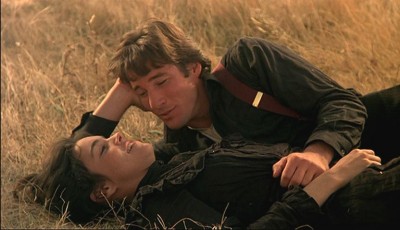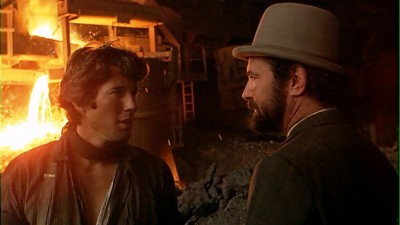
I didn’t see Terrence Malick Days of Heaven when it came out in 1978. I hadn’t liked Malick first film, Badlands (1973). I wasn’t drawn to this. The title didn’t appeal to me. Nothing that I’d read appealed to me. I didn’t care for the poster — even the font used for the title did nothing for me. In fact, it wasn’t till last week that I caught up with it, and I suspect my reaction to it at this late date — especially after seeing The Tree of Life — is markedly different than it would have been in 1978. I can only guess, but I imagine that my 1978 take would have been a mix of boredom and slight distaste — balanced out some by the film’s incredible visuals. Today? Well, it’s still not exactly the sort of thing I naturally gravitate toward, but in the greater context of Malick films I’ve seen, it’s a very different proposition than it would be as a stand-alone work. Out of that context, Days of Heaven has a quality that is not far removed from the best of the late era silent films. Aspects of it — especially the way that the film is so grounded in the landscape — actually remind me of F.W. Murnau’s City Girl (1930). But there’s something more primitive about Malick film — or perhaps I should say “primal.” And that’s where seeing it as part of a larger body of work comes into play. Having a greater sense of Malick interests and concerns of film as something other than a medium for telling stories, he attempts to place the viewer in the context of the film, to feel what the characters feel, experience what they experience, see this world as they see it.

The question arises: Does the attempt work? Not entirely — at least for me — but I admire the attempt, and appreciate the fact that it sometimes does work. Malick seems to me to be approaching film more like music than anything else — and that’s perhaps why the things I take away from his films are connected to his use of music and image. Whether it’s Smetana’s “Moldau” and Mahler’s First Symphony in The Tree of Life, Wagner’s Das Rheingold in The New World, or Saint-Saens’ “Carnival of the Animals” here, these are the things most etched into my brain by the films. The story is almost incidental. The problem with this — apart from baffling the audience expecting a story — is that Malick notions of evoking a universal experience is limited by his own sense of those experiences. (Frankly, I never got the rapturous joy Malick appears to get out of aimlessly running around in a field — which is apparently his vision of happiness.) This isn’t to say that he’s incapable of creating more traditional drama. Consider the locust plague here — and it’s not so much the big scenes I’m talking about. Look at the way it starts and builds on the reality of what’s happening with subtly increasing dread. This is the work of a filmmaker perfectly capable of crafting a film in a classical manner. He just doesn’t choose to.
The Hendersonville Film Society will show Days of Heaven Sunday, Feb. 17 at 2 p.m. in the Smoky Mountain Theater at Lake Pointe Landing Retirement Community (behind Epic Cinemas), 333 Thompson St., Hendersonville.




Before you comment
The comments section is here to provide a platform for civil dialogue on the issues we face together as a local community. Xpress is committed to offering this platform for all voices, but when the tone of the discussion gets nasty or strays off topic, we believe many people choose not to participate. Xpress editors are determined to moderate comments to ensure a constructive interchange is maintained. All comments judged not to be in keeping with the spirit of civil discourse will be removed and repeat violators will be banned. See here for our terms of service. Thank you for being part of this effort to promote respectful discussion.